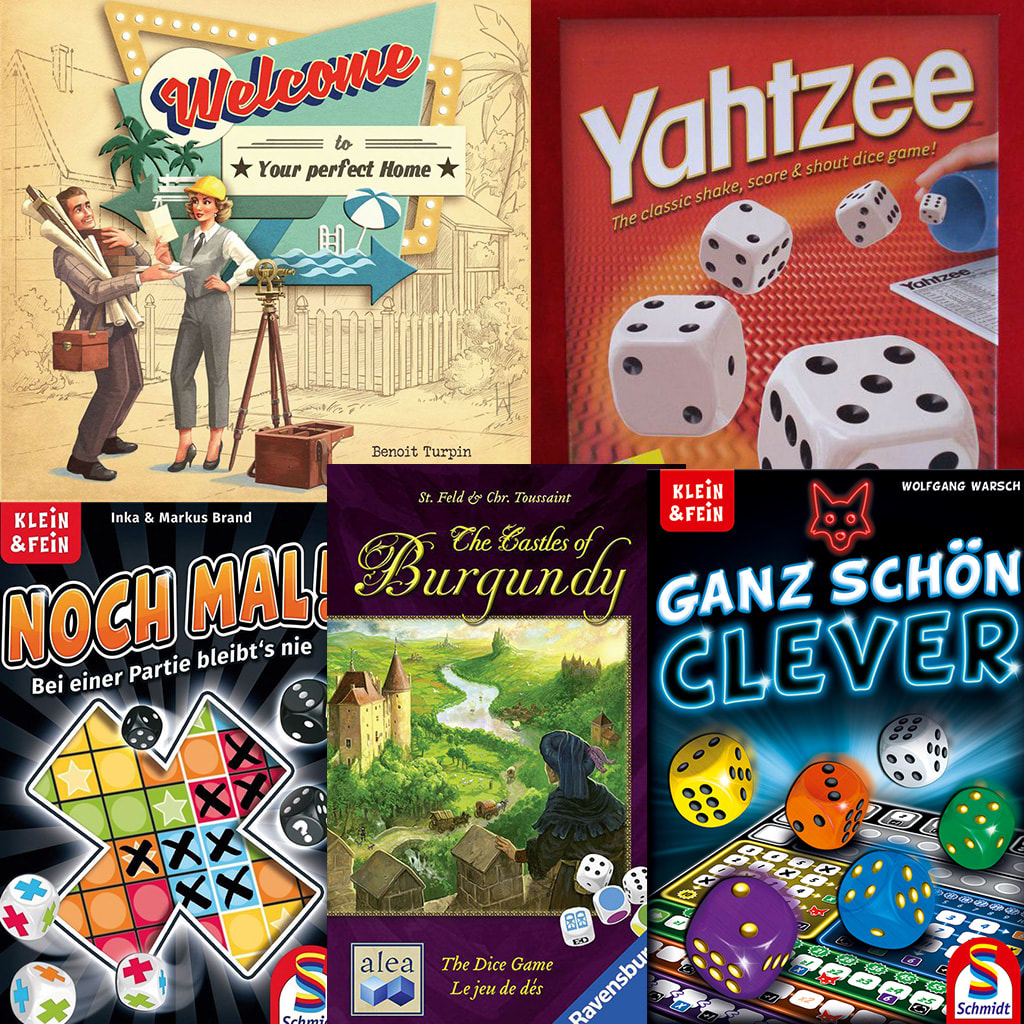So, I've been thinking about roll and write games quite a bit lately. It definitely seems like this is one of the current fads in games; compact games that you play on a pad of specially-made score sheets, using dice and a pencil. Of course, Yahtzee (and it's predecessor, Yacht) has been around for a long time, pretty much being the first roll and write game. But the genre has been booming lately.
I know a couple of my designer friends have been trying to make roll and write games. They're not bad; in particular, one friend is making a casino-themed roll and write game with cards and dice that is shaping up really well. I also tried making my own, though my first playtest of that was a pretty big failure. Still, there might be something to my game, if I can just figure out where I went wrong.
I'm thinking I might not truly know what makes a roll and write game fun. Or, alternately, maybe this type of game does not appeal to me, and I'm going down the road of trying to create a game that I ultimately won't enjoy playing. To that end, I've been trying to get my hands on various roll and write games out there. (Playing board games and calling it research! :) Gotta love this hobby.) Sure, I've played Yahtzee lots of times, so I know how that flows. Ganz Schön Clever is a step up from that, with multiple colored scoring areas and different rules and point values for each one. Noch Mal! adds a two-dimensional aspect to the game, as you can only score places on the grid that you're adjacent to. The Castles of Burgundy dice game is another step in that direction, with a hex grid and adjacency restrictions, as well as one-use special abilities that can be obtained by marking hexes of certain colors. And the newest one onto my scene is Welcome To..., which is a card-flipping game where you are filling in house numbers on streets, with special powers associated with each of the available number cards.
I've noticed a trend in these games, one which I think might apply to the genre as a whole. Each of these games on some level creates tension by reducing the player's options over the course of the game. When these games first start, you have a blank slate to work with and the ability to place marks anywhere, subject to some sort of placement rules. But as the game progresses, your options on your turn become progressively more limited. Sure, games like Noch Mal! and Castles of Burgundy dice game have a map that you spread out on, so your options expand initially, but as the map fills up you are again left with diminishing possibilities. This forces you to plan ahead, both mapping out your strategy and trying to leave leeway for bad dice rolls or card flips. Some games have ways to mitigate bad luck, but those are finite and often run out just before those last few turns of the game when you really need them.
Other more traditional board games generate their tension in other ways. I'm know there are typical strategy games out there that try to amp up the game tension by having options run out. However, those often have other mechanics that you have to navigate, and the disappearing possibilities are often because other players have chosen those options, making them inaccessible for the remainder of the game. Roll and writes seem to be heavily reliant on this idea of you limiting yourself later in the game, forcing you to really think ahead.
So, what if there was a roll and write game that created interesting decisions without using this shrinking decision space method? A way to continually open up possibilities over the course of the game, rather than reducing them? Better ways to interact with other players and be affected by their choices? (The norm for roll and writes seems to be that all players can pick from the same pool of possibilities, though the 'active' player gets something extra. Great for asynchronous play, bad for interactive moments.) Ways to mark other players' boards? Ways to erase marks? Ways to temporarily have resources without marking a board? (Mind the component count, though; one plus of roll and write games are how light and compact they are.) I know I've only played a small sliver of the roll and write games out there, but I know the entire design space hasn't been traversed yet. There's plenty of room for adventurous designers to do some trailblazing here.
Maybe I'll end up making something unique, eventually. Here's hoping.
I know a couple of my designer friends have been trying to make roll and write games. They're not bad; in particular, one friend is making a casino-themed roll and write game with cards and dice that is shaping up really well. I also tried making my own, though my first playtest of that was a pretty big failure. Still, there might be something to my game, if I can just figure out where I went wrong.
I'm thinking I might not truly know what makes a roll and write game fun. Or, alternately, maybe this type of game does not appeal to me, and I'm going down the road of trying to create a game that I ultimately won't enjoy playing. To that end, I've been trying to get my hands on various roll and write games out there. (Playing board games and calling it research! :) Gotta love this hobby.) Sure, I've played Yahtzee lots of times, so I know how that flows. Ganz Schön Clever is a step up from that, with multiple colored scoring areas and different rules and point values for each one. Noch Mal! adds a two-dimensional aspect to the game, as you can only score places on the grid that you're adjacent to. The Castles of Burgundy dice game is another step in that direction, with a hex grid and adjacency restrictions, as well as one-use special abilities that can be obtained by marking hexes of certain colors. And the newest one onto my scene is Welcome To..., which is a card-flipping game where you are filling in house numbers on streets, with special powers associated with each of the available number cards.
I've noticed a trend in these games, one which I think might apply to the genre as a whole. Each of these games on some level creates tension by reducing the player's options over the course of the game. When these games first start, you have a blank slate to work with and the ability to place marks anywhere, subject to some sort of placement rules. But as the game progresses, your options on your turn become progressively more limited. Sure, games like Noch Mal! and Castles of Burgundy dice game have a map that you spread out on, so your options expand initially, but as the map fills up you are again left with diminishing possibilities. This forces you to plan ahead, both mapping out your strategy and trying to leave leeway for bad dice rolls or card flips. Some games have ways to mitigate bad luck, but those are finite and often run out just before those last few turns of the game when you really need them.
Other more traditional board games generate their tension in other ways. I'm know there are typical strategy games out there that try to amp up the game tension by having options run out. However, those often have other mechanics that you have to navigate, and the disappearing possibilities are often because other players have chosen those options, making them inaccessible for the remainder of the game. Roll and writes seem to be heavily reliant on this idea of you limiting yourself later in the game, forcing you to really think ahead.
So, what if there was a roll and write game that created interesting decisions without using this shrinking decision space method? A way to continually open up possibilities over the course of the game, rather than reducing them? Better ways to interact with other players and be affected by their choices? (The norm for roll and writes seems to be that all players can pick from the same pool of possibilities, though the 'active' player gets something extra. Great for asynchronous play, bad for interactive moments.) Ways to mark other players' boards? Ways to erase marks? Ways to temporarily have resources without marking a board? (Mind the component count, though; one plus of roll and write games are how light and compact they are.) I know I've only played a small sliver of the roll and write games out there, but I know the entire design space hasn't been traversed yet. There's plenty of room for adventurous designers to do some trailblazing here.
Maybe I'll end up making something unique, eventually. Here's hoping.


 RSS Feed
RSS Feed